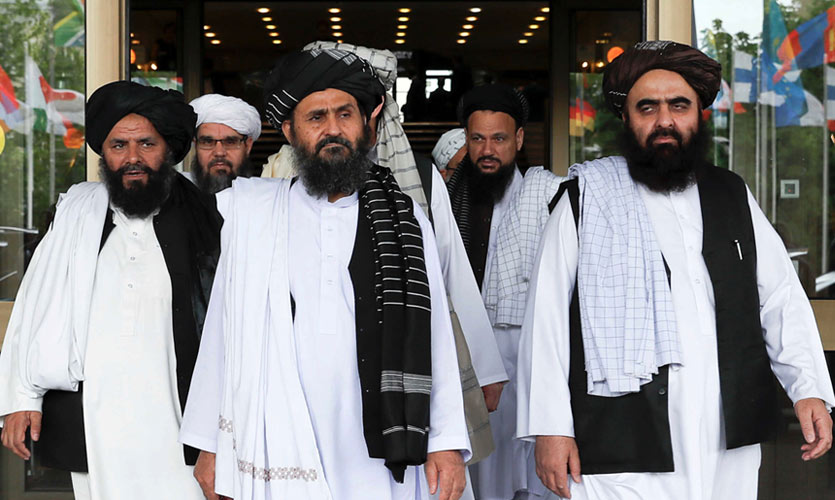More than two months after the fall of Kabul, India will interact and engage with the Taliban at the Moscow Format meeting in person today. J.P. Singh, the joint secretary heading the Pakistan-Afghanistan-Iran desk in the External Affairs Ministry will lead the Indian delegation, and the meeting will be addressed by Russian Foreign Minister Sergey Lavrov. The neighbouring countries that have high stakes in the future of Afghanistan will also take part in the meeting to plan a roadmap for peace and security in the nation with the interim Taliban government. The fall of the Western-backed Afghan government and the subsequent rise of Taliban 2.0 has immense regional and geopolitical implications that could potentially paint the future trajectory of terrorism in the western and southern parts of Asia.
New Delhi accepted Russia’s invitation to join the Moscow Format meeting on Afghanistan, which to be held today. Representatives of the Taliban’s interim government along with delegates from China, Pakistan, Iran and other countries will also be in attendance. This will be the second time that India will come face-to-face with the Taliban officials at similar meeting since 2018, and also the second time that there will be formal contact between the two countries since the Taliban takeover in August.
So far, India has maintained its stance that it won’t recognise the Taliban’s interim government amid the increased attacks on minorities, women’s rights, human rights violations, and the rise in attacks by the ISKP. Though the world community has been mounting pressure on the Taliban to walk in line with their promised pledges as per the Doha Agreement 2020, the situation on ground is completely paradoxical. The Moscow Format could potentially set out a roadmap for peace and stability in the region over a considerable period of time.
Following this, New Delhi is likely to host a national security advisor-level meeting on Afghanistan in New Delhi next month, and has also invited Pakistan’s NSA Moeed Yusuf in a surprising move. As per reports, the tentative dates of this in person dialogue are November 10-11, and the format will be similar to the regional security conference held in Iran way back in 2019. Apart from Russia, Tajikistan, Uzbekistan, Pakistan and China have also been invited.
New Delhi’s Biggest Concerns
At a time when attacks against non-locals and minorities in the Kashmir Valley have increased, there have been fresh rumours underscoring the security concerns in Jammu & Kashmir, in relation to the Taliban’s rise to power. The sudden rise of attacks targeting minorities like Shias and Hazaras in Afghanistan, has been compared to the situation in Kashmir where a number of minority locals, Muslim majority civilians accused of helping the minorities and the BJP, and non-local workers have been killed. This has alarmed the intelligence and security agencies. As the central government has made every effort to encourage some 62,000 registered Kashmiri migrants to return, the recent “targeted killings” have been discouraging, with the focus shifting to prevent a second round of the 1990 exodus.
There has been a sudden increase in the number of militant activities in the valley since the past two months. Michael Kugelman, a South Asia specialist at the Wilson Centre in Washington, said that Afghanistan’s new rulers could inspire “stepped up unrest” in Kashmir, as quoted by the Dawn.
In response, the security establishment in Kashmir can be seen taking extra measures to prevent any more such atrocities by conducting raids against stone pelters, suspected over ground workers (OWGs) of militant outfits and other “undesirable elements” and “potential troublemakers” creating an atmosphere of fear in the valley.
The phenomenon of Afghan origin jihadists infiltrating the LOC to enter the Indian side of Kashmir is not new, especially considering the early years of militancy in the 1990s. However, such instances despite secure borders and high-tech vigilance are more concerning than ever before.
Read more: Kashmiri Pandits: Exiled With No End In Sight
Most Indian military officials have alleged Pakistan’s involvement in helping these militant outfits and assisting the jihadist forces such as the Jaish-e-Mohammed and the Lashkar-e-Taiba, possibly capitalising on the Taliban’s rise. As per a report, “After Taliban took over the government in Afghanistan, we have got the input regarding the movement of Afghanistan-based militants entering India with the help of Pakistan-based organizations which are backed by ISI,” ANI quoted an official. The Taliban’s direct involvement in Kashmir remains unclear.
In this prevailing situations, New Delhi could plan more such diplomatic discussions with regional states in order to prevent Afghan soil becoming a haven for these jihadist outfits which could potentially harm New Delhi’s stakes and legitimacy in J&K and could further deteriorate the situation in South Asia.










